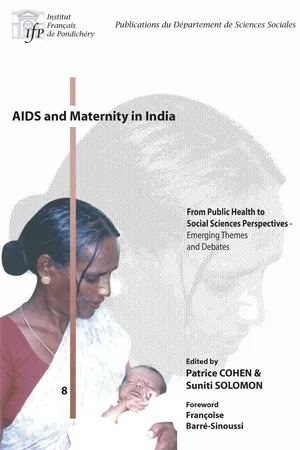
Aids and maternity in India
From public health to social sciences perspectives. Emerging themes and debates
- English
- ePUB (mobile friendly)
- Available on iOS & Android
Aids and maternity in India
From public health to social sciences perspectives. Emerging themes and debates
About this book
At a time when the number of people, and in particular women, living with HIV/AIDS in India is increasing, the aim of this publication is to contribute to the understanding of mother-to-child transmission (MTCT) and of its prevention. Indian and French specialists (medical practitioners, social scientists, activists) have been brought together to elucidate different aspects of this transmission and its possible prevention. Due to the numerous factors involved in the risks of transmission, and the social and cultural complexity of maternity in India, all these contributions show the necessity of initiating and conducting research in the fields of the social sciences. Considerations as to the need of research are formulated which can be of interest to the whole domain of social sciences. These proposals - mainly perceived in the areas of social anthropology or psychology - are exploring the links between the social and cultural settings and the risks of transmission from the mother to the child in taking into account all the parameters of the ongoing prevention made by the public and private sectors. The three routes of transmission - pregnancy, delivery and breastfeeding - are analysed here as practices embedded to maternity and on the perception of risks of transmission, and on possibilities of prevention. And this exploration shows that in fact these topics reveal a large part of the functioning of contemporary dynamics of the Indian society. This proposal could therefore be enlarged and adapted to such different disciplines as economy, demography, law, geography, history or sociology in combination with public health and epidemiology. These perspectives are an invitation to develop further research in each discipline, but also to develop multidisciplinarity, interdisciplinarity, or transdisciplinarity. In the context of the spread of the HIV/AIDS epidemic in India, MTCT is seen to be increasingly crucial. Because this subject has only recently begun to emerge in India, available publications concerning it are rare. This book is made to a large public as for those making decisions in the domain of public health, for medical, epidemiological and social scientists, as well as for medical institutions, NGOs and all people involved in the understanding and the prevention of the epidemic in India. The different contributions presented here are intended to broaden ongoing debates and analyses of Indian society in its confrontation with the HIV/AIDS epidemic, especially as regards the infection of women and children.
Frequently asked questions
- Essential is ideal for learners and professionals who enjoy exploring a wide range of subjects. Access the Essential Library with 800,000+ trusted titles and best-sellers across business, personal growth, and the humanities. Includes unlimited reading time and Standard Read Aloud voice.
- Complete: Perfect for advanced learners and researchers needing full, unrestricted access. Unlock 1.4M+ books across hundreds of subjects, including academic and specialized titles. The Complete Plan also includes advanced features like Premium Read Aloud and Research Assistant.
Please note we cannot support devices running on iOS 13 and Android 7 or earlier. Learn more about using the app.
Information
Table of contents
- Cover
- Bibliographic informations
- First pages
- Table of contents
- List of Tables, Figures and Appendices
- Editors and Scientific Advisory Committee
- List of Authors
- Acknowledgements
- Foreword
- Introduction
- Part 1. HIV/AIDS epidemic in India
- Part 2. Prevention of HIV/AIDS mother to child transmission
- Part 3. Vulnerability of indian women for diseases and for HIV/AIDS
- Part 4. Mtct risks factors and practices in India: social sciences perspectives